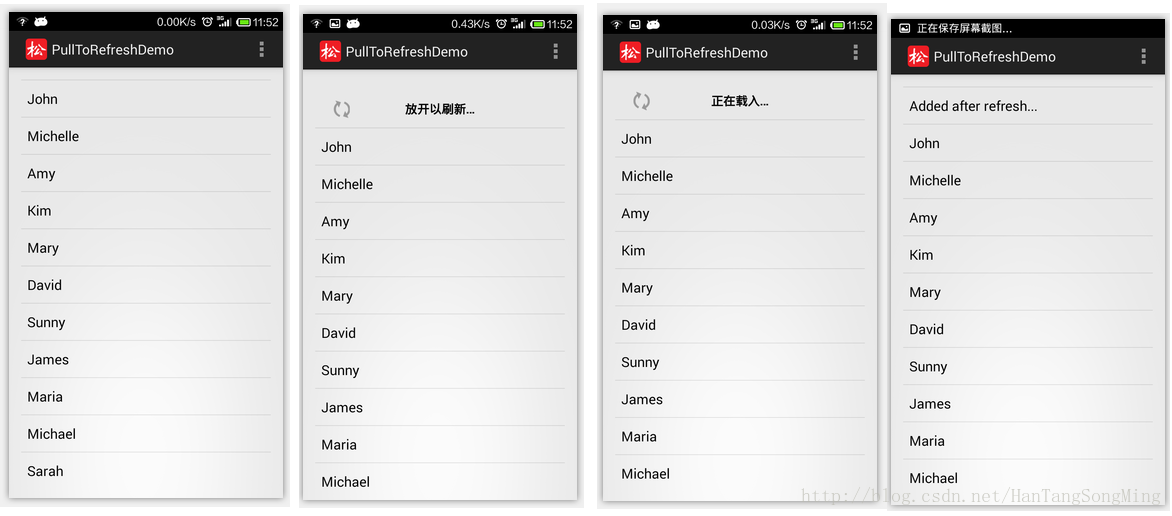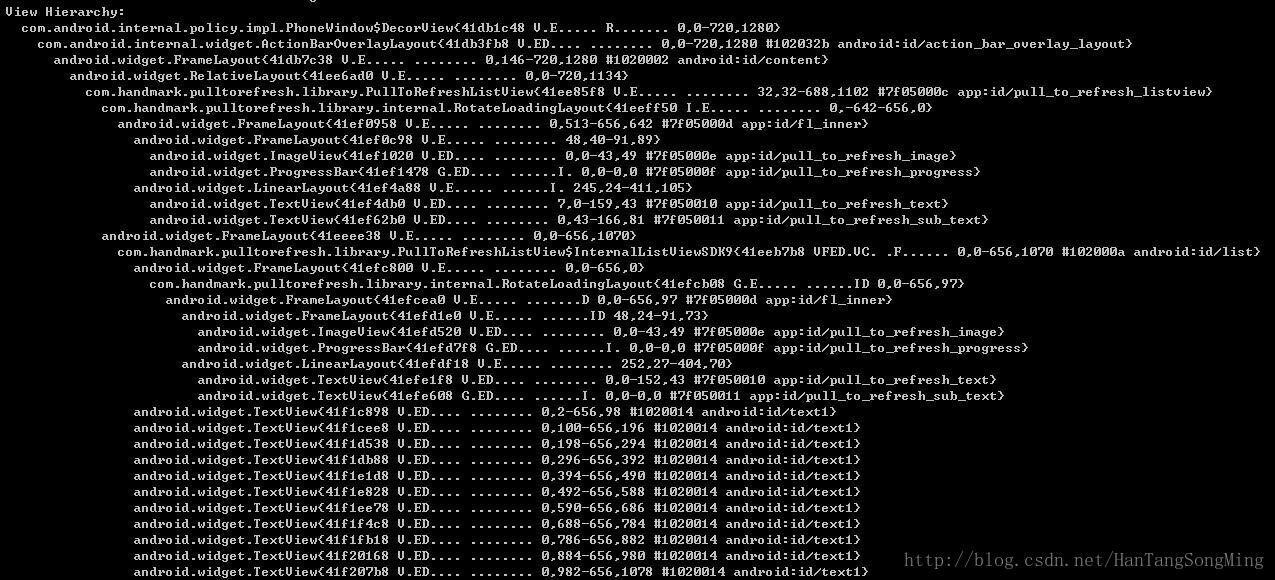ListView
ExpandableListView
GridView
WebView
ScrollView
HorizontalScrollView
ViewPager
等多种常用的需要刷新的View类型,而且使用起来也十分方便。
(下载地址: https://github.com/chrisbanes/Android-PullToRefresh)
PullToRefresh基本用法:
1、在布局文件中添加PullToRefresh控件,比如PullToRefreshListView;
2、在Activity中,设置监听器OnRefreshListener以响应用户下拉操作;
3、在监听器的onRefresh()方法中执行数据刷新操作,可以通过AsyncTask来实现;
4、在AsyncTask中获取到数据后,记得调用onRefreshComplete()方法通知PullToRefresh控件数据已获取完毕,可以结束刷新操作。
实例:PullToRefreshDemo
运行效果:
视图结构
代码清单:
布局文件:activity_main.xml
<RelativeLayout xmlns:android="http://schemas.android.com/apk/res/android"
xmlns:tools="http://schemas.android.com/tools"
android:layout_width="match_parent"
android:layout_height="match_parent"
android:paddingBottom="@dimen/activity_vertical_margin"
android:paddingLeft="@dimen/activity_horizontal_margin"
android:paddingRight="@dimen/activity_horizontal_margin"
android:paddingTop="@dimen/activity_vertical_margin"
tools:context=".MainActivity" >
<com.handmark.pulltorefresh.library.PullToRefreshListView
android:id="@+id/pull_to_refresh_listview"
android:layout_height="fill_parent"
android:layout_width="fill_parent" />
</RelativeLayout>
Java源代码文件:MainActivity.java
package com.rainsong.pulltorefreshdemo;
import java.util.Arrays;
import java.util.LinkedList;
import android.app.Activity;
import android.os.AsyncTask;
import android.os.Bundle;
import android.text.format.DateUtils;
import android.view.Menu;
import android.widget.ArrayAdapter;
import android.widget.ListView;
import com.handmark.pulltorefresh.library.PullToRefreshBase;
import com.handmark.pulltorefresh.library.PullToRefreshBase.OnRefreshListener;
import com.handmark.pulltorefresh.library.PullToRefreshListView;
public class MainActivity extends Activity {
private PullToRefreshListView mPullToRefreshListView;
private LinkedList<String> mListItems;
private ArrayAdapter<String> mAdapter;
@Override
protected void onCreate(Bundle savedInstanceState) {
super.onCreate(savedInstanceState);
setContentView(R.layout.activity_main);
// Set a listener to be invoked when the list should be refreshed.
mPullToRefreshListView = (PullToRefreshListView) findViewById(R.id.pull_to_refresh_listview);
mPullToRefreshListView.setOnRefreshListener(new OnRefreshListener<ListView>() {
@Override
public void onRefresh(PullToRefreshBase<ListView> refreshView) {
String label = DateUtils.formatDateTime(getApplicationContext(), System.currentTimeMillis(),
DateUtils.FORMAT_SHOW_TIME | DateUtils.FORMAT_SHOW_DATE | DateUtils.FORMAT_ABBREV_ALL);
// Update the LastUpdatedLabel
refreshView.getLoadingLayoutProxy().setLastUpdatedLabel(label);
// Do work to refresh the list here.
new GetDataTask().execute();
}
});
ListView actualListView = mPullToRefreshListView.getRefreshableView();
mListItems = new LinkedList<String>();
mListItems.addAll(Arrays.asList(mStrings));
mAdapter = new ArrayAdapter<String>(this, android.R.layout.simple_list_item_1, mListItems);
actualListView.setAdapter(mAdapter);
}
private class GetDataTask extends AsyncTask<Void, Void, String[]> {
@Override
protected String[] doInBackground(Void... params) {
// Simulates a background job.
try {
Thread.sleep(4000);
} catch (InterruptedException e) {
}
return mStrings;
}
@Override
protected void onPostExecute(String[] result) {
mListItems.addFirst("Added after refresh...");
mAdapter.notifyDataSetChanged();
// Call onRefreshComplete when the list has been refreshed.
mPullToRefreshListView.onRefreshComplete();
super.onPostExecute(result);
}
}
@Override
public boolean onCreateOptionsMenu(Menu menu) {
// Inflate the menu; this adds items to the action bar if it is present.
getMenuInflater().inflate(R.menu.main, menu);
return true;
}
private String[] mStrings = { "John", "Michelle", "Amy", "Kim", "Mary",
"David", "Sunny", "James", "Maria", "Michael", "Sarah", "Robert",
"Lily", "William", "Jessica", "Paul", "Crystal", "Peter",
"Jennifer", "George", "Rachel", "Thomas", "Lisa", "Daniel", "Elizabeth",
"Kevin" };
}
实例源代码下载 http://download.csdn.net/detail/hantangsongming/8336075

